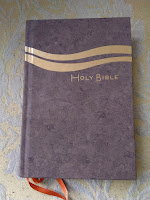Finally after many failed attempts to repeat the whole bible reading feat, I have decided to abandon the more scholarly study plans I've attempted in recent years and return to the approach that served me so well 20 years ago - with one difference. Last year I wrote a dissertation about learning style and biblical study, during which I discussed the premise I have long held, that I learn best by doing something with the material I'm studying. What I have decided to do with the material this time is to summarize each chapter of each book into a 'pithy' sentence, then look for interesting themes and ideas in the sentences I have created from each chapter. I hope this will prove to be a simple way to meditate on scripture, and I also hope it will help me to grow in familiarity with the texts and to grow in faith (mediating on scripture is supposed to do this, according to Christian tradition)
The other significant change from the last time I successfully read the whole bible is the choice of translation. While I am still fond of the GNT and continue to find its simplicity helpful, I've reached a point where I feel a more rigorous and challenging translation could be helpful. I find the New Revised Standard Version (NRSV) good for sermon preparation, but it's never been a translation that I would choose to read for fun, so I'm employing the relatively new Common English Bible. The CEB was released in 2011 and produced by an alliance of 120 scholars from 24 faith traditions, and reviewed by 77 reading groups from a huge variety of congregations (so says the preface of my edition). The diversity of thought guiding this translation as well as the deliberate attempts to use gender-inclusive or neutral syntax wherever contextually possible appeals to me.
My plan is to read one chapter at a time and to choose books in a fairly whimsical order, as I did before. I'm more than a month in as I write this and generally am finding that I read 5 or 6 days per week (which I do as part of morning prayer). As there are somewhere in the region of 1189 chapters it should take around 3 years, but I'm handling the psalms a little differently, so this is likely to shorten the span. I read a psalm a day as part of my morning prayer routine (except 119 which needs to be divided into bite-size chunks) so I will be reading the psalms more than once as I traverse the rest of the texts.
In this blog I will write out the sentences inspired by my imagination as I read each chapter or psalm and the rationale (if any) behind the order of reading. Then I'll briefly discuss my overall impressions of each book. I'm expecting this to be fun, if it's not I will adapt my plan accordingly - I'm not in this for the suffering...
I should also point out (unnecessarily I imagine) that this is not a scholarly study of the bible - if you quote me in an essay you will lose marks! All of the opinions shared are my own, although I may occasionally refer to commentaries when I look up something that piques my interest. I won't quote directly and don't intend to cite sources (remember - not a scholarly work!)
